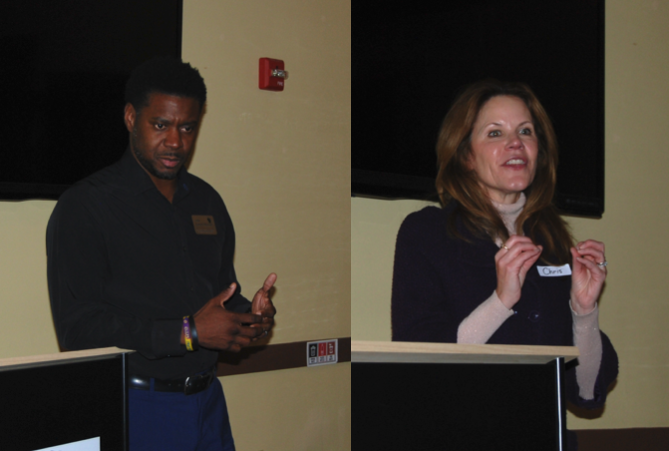By Kim McDarison
Two judicial candidates, one running for an open seat on the state Supreme Court and a second running for an appellate court seat, were among speakers Sunday at the Fort Atkinson Club Community Center.
The two followed oration given by progressive journalist and author John Nichols.
The full program, which included a reception, titled: “Forward Together,” was hosted by the Jefferson County Democratic Party. The event was free and open to the public.
Comments made by Nichols are found here: https://fortatkinsononline.com/john-nichols-addresses-jefferson-county-democrats-at-fort-community-club/.
Supreme Court race
Four nonpartisan candidates have announced their intentions to run for a seat held by Justice Patience Roggensack who will not seek another term. They are Milwaukee County Circuit Court Judge Janet Protasiewicz, Dane County Circuit Court Judge Everett Mitchell, who was in attendance and addressed event-goers Sunday, former Justice Daniel Kelly, who served from 2016 to 2020, losing his seat to Justice Jill Karofsky, and Waukesha County Circuit Court Judge Jennifer Dorow, who recently presided over the trial of Darrell Brooks, a defendant convicted of killing six people attending a Christmas parade last year.
The names of candidates running for the Supreme Court seat will appear first on a primary ballot in February, with the top two vote-getters advancing to the April election.
From the podium, Mitchell told attendees Sunday that when he was running for a seat on the Dane County Circuit Court, he was told that he would not succeed because he was too young, his supporters wouldn’t vote and he didn’t have enough money.
Sharing a story about appellate court candidate Chris Taylor, who also serves as a judge in Dane County and was in attendance Sunday, he said: “I sat down at a coffee shop with Chris Taylor and she said we will get them to vote, and we will find you the money because you deserve to be there.”
Mitchell said Taylor’s confidence in him was instrumental in helping him embrace his campaign and succeeding in Dane County.
Advocating for her candidacy, he said: “There is no better deal than Chris Taylor.”
Citing comments made by Nichols about the race for a Supreme Court seat, Mitchell said: “These elections are crucial because it gives us an opportunity to demonstrate the character of our state together.”
He added: “I’m running because I believe our state deserves a Justice that reflects the diversity and ideas of our entire state. As I told you before, I believe that justice is not what you say, it’s what you do.”
Mitchell said on Saturday, he was in Viroqua, where he learned from rural constituents that they felt left out.
“The conversation the entire evening was about how the rural community does not feel involved in these statewide races — that they feel left out — they feel like their voice in not heard, and they are not included in this process,” Mitchell said.
He said he told constituents in Viroqua that he was spending more of his campaign time in rural areas than in larger communities like Madison, Milwaukee, Kenosha and Racine. He added that while he suspected he would have a chance to visit those communities, he didn’t want the rural communities to feel unheard.
“I don’t want them to be so in a position that they haven’t met me, that when the ads start saying crazy stuff, that they become afraid. I want you to be like: ‘That’s him! That’s our guy right there! That’s my man!’” he said.
Looking at the state broadly, he said: “ Everyone is fighting for a sense of fairness and trust in our court system. Everyday we walk in our court system and we see the inequity, the unfairness, that many of you may not see, but a lot of us who have chosen this path, we see it all the time. Our court systems are not fair. Our court systems are not equitable, because the types of individuals who get into those positions do not always see the necessity to make sure that people are treated fairly.”
Mitchell said he believed in a separation between church and state, but also, he said, “There should be a separation between justice and partisanship, and politics, and cronyism, because if we don’t have that, all you do is get a whole bunch of decisions that are meant to rob us of our fundamental rights of who we are as a democracy.”
Said Mitchell: “Think about this: there’s no other time in our history that the Supreme Court has reached into a bundle of rights and taken one out — for a purpose. It was completely political. It was completely partisan, and it was completely intentional, and made because they were trying to make a point, to weaken the rights of those who sometimes need it the most. And they will not stop.”
At risk, he said, was a level of voting rights “that give access to men and women so they could be able to vote.”
He continued: “And Clarence Thomas said it, because he put those things out there as a way to telegraph to all of us that these things will be on the table for us to review. They’re fundamentally, trying to reshape our democracy by taking away those rights from us. And using the constitution and our court systems to be able to do it.”
Describing himself as someone “who has been in this world fighting for rights, fighting for justice, working for men and women who have been in prison, standing up for women’s rights, and standing for LGBT,” and working to “make sure that court systems are fair and just and equitable,” Mitchell said: “I don’t care who you are, when you come into my court — you could be a Republican, you could be a Democrat, you could be a liberal, you could be conservative — but when I look at you, I look at your cases, I see a human being. And that human being deserves a right to make sure the judge and the Justices who are hearing that case are willing to give you a chance to hear it.”
Pointing to his state Supreme Court race opposition, Mitchell called Dorow a “princess media judge” who entered the race “last minute.”
“You got Dan Kelly who’s like the rehash of an old commercial trying to be relevant again,” he said.
Calling the state Supreme Court race “critical,” Mitchell said: “It is important for you to pay attention because everybody is going to come up to you and say this line: ‘I’m going to be fair, I’m going to be impartial, I’m going to treat everybody with a level of respect.’ Your job is not to get lost in that. Your job is to ask the question: ‘Show me how you have been fair. Show me how you have been just. What have you stood for when you take your robe off and you represent yourself to the community? because, to me, that is what distinguishes me from all these other candidates. It’s not just what you are on the bench — that is important — but it’s more so what you are off the bench that lets people know what your true values are.”
Mitchell closed with comments about racism.
He said: “I don’t believe our state is racist. I don’t believe our state is a bunch of racist people sitting out there who can’t look at a Black man and look at the credentials of who I am. As you said, Mandela was close. They ran ads, and I will say, I have paid my taxes, so that’s good.”
Mitchell described himself as a husband and father, and a member of a “faith community I have lived, and lived in, and worked in, but what’s most important is that I see the value of who we are when we come together.”
He added: “We will win this race. It will be because rural and urban, Black, white, rich, poor, gay, straight, have decided that they will have a different dream for Wisconsin. And when we win the Supreme Court, and give us that sense of balance back again, it will remind us of what John (Nichols) said: this is the progressive state. This is the linchpin of the Midwest.”
He said other states would look to Wisconsin as an example of how to “pull forward,” and, he said, “we ain’t letting nothing pull us back.”
Court of Appeals District 4
Offering comments from the podium, Taylor sought to bring understanding of the appellate court system, asking rhetorically: “What the heck does the Court of Appeals do?”
She answered: “The Court of Appeals is a middle court, it’s after the trial court. I serve on a trial court with Judge Everett Mitchell … and the appellate court looks at what we do everyday on the trial court to make sure people have a fair chance; that their rights are respected, and this is fundamental. This is what courts should be doing, not taking our rights away. Courts are to protect and enhance our rights, and that is my passion.”
Taylor said that from the time she was “a little girl” she was drawn to such causes as fair treatment for women.
“This really motivated a lot of the trajectory of my career. I was very fortunate to serve with Don Vruwink … in the Assembly for nine years, working on the most fundamental human rights — the right to vote, the right to have fair districts, so your vote actually counts. That’s really what it’s about. Gerrymandering is to deny you your right to have your vote counted,” she said.
She continued: “Courts have a fundamental piece of addressing this inequity. This issue is, I think, going to be solved in the courts. So it does matter who you have and this is a nonpartisan race. I’m not running as a Democrat, but I can tell you, I believe the values I think we all share in truly having courts that respect democracy, that respect people’s rights, and that are there to defend people’s rights, and enhance rights — not take rights, not roll back rights. And so that is just so important in the judiciary, and we have a chance for that in the judiciary.”
Taylor said during the course of her career she served for eight years with Planned Parenthood of Wisconsin, working with the organization as its legal and policy director.
Pointing to the 14th Amendment of the U.S. Constitution, she said the amendment (which was passed after the Civil War) “guarantees people the right of liberty,” further noting that the amendment was passed to ensure that formerly enslaved people did not meet with discrimination.
She asked: “How on Earth could it not have a right to bodily autonomy and integrity? It makes no sense. Of course it must in order to truly liberate and free people. And so those are the kinds of things we are seeing come at the higher courts, these retractions of our rights. That is why it is so critical — these races are so very important.
“I don’t have an opponent right now. I anticipate I probably will. I don’t think there are a lot of — there’s a segment — of people who don’t want me to go up in the court system, because they know how much I value human rights, the rights of fair elections.”
Taylor described the Court of Appeals District 4 as “big” extending across some 24 counties.
“Jefferson is the most eastern county in this district,” she said.
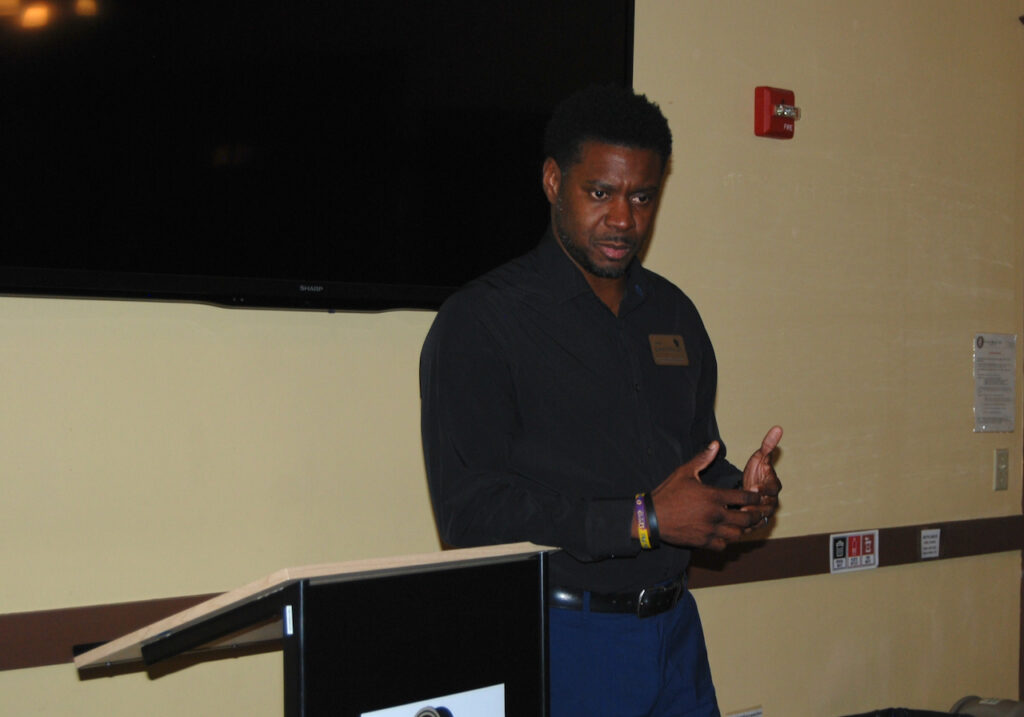
Dane County Circuit Court Judge Everett Mitchell, who is running for an open seat on the Wisconsin Supreme Court, addresses some 45 people in attendance at a reception held Sunday by the Jefferson County Democratic Party at the Fort Atkinson Club Community Center.
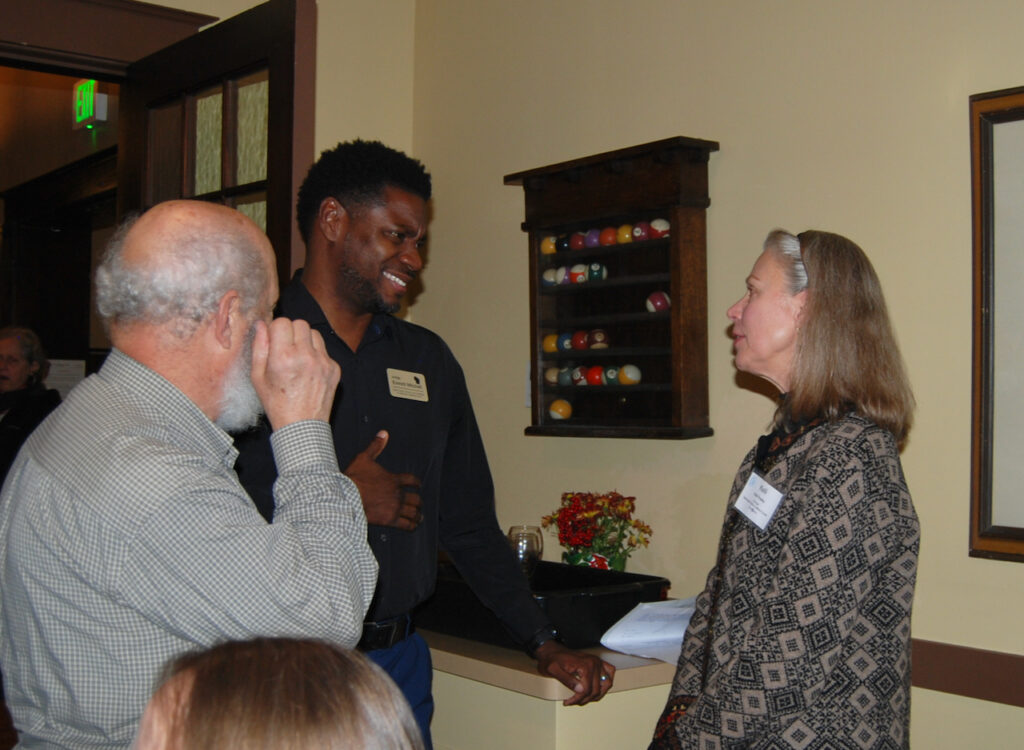
Wisconsin Supreme Court candidate Everett Mitchell, at center, visits with Jefferson County Democratic Party Co-Chair Kelli Rowley, at left, and an attendee during a reception held Sunday at the Fort Atkinson Club Community Center.
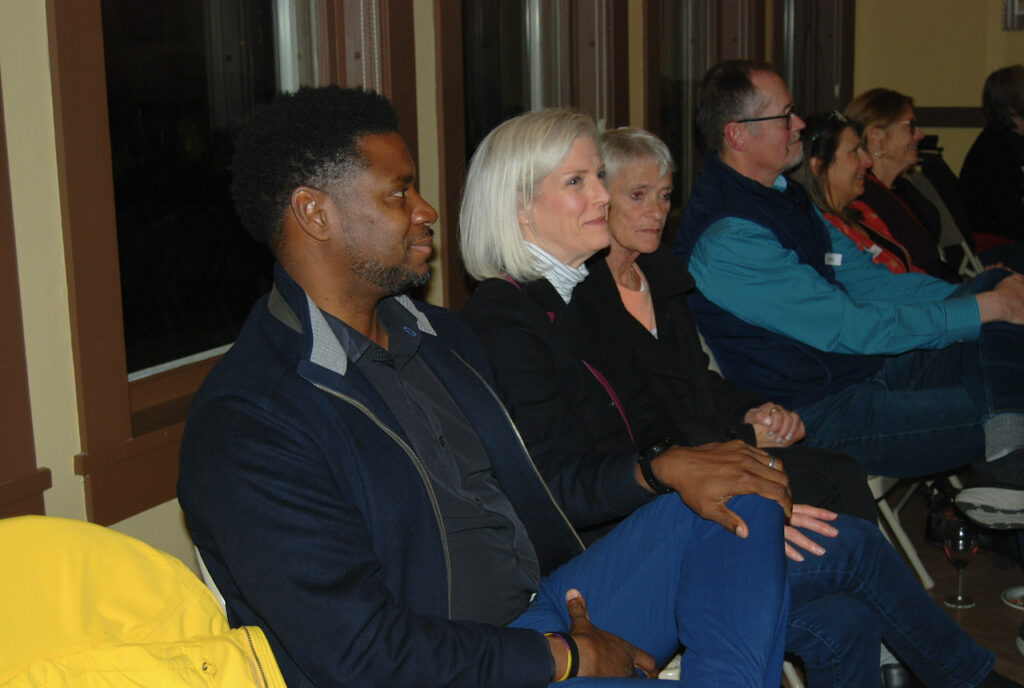
Wisconsin Supreme Court candidate Everette Mitchell, at left, listens as keynote speaker John Nichols, not pictured, addresses attendees at a reception hosted by the Jefferson County Democratic Party.
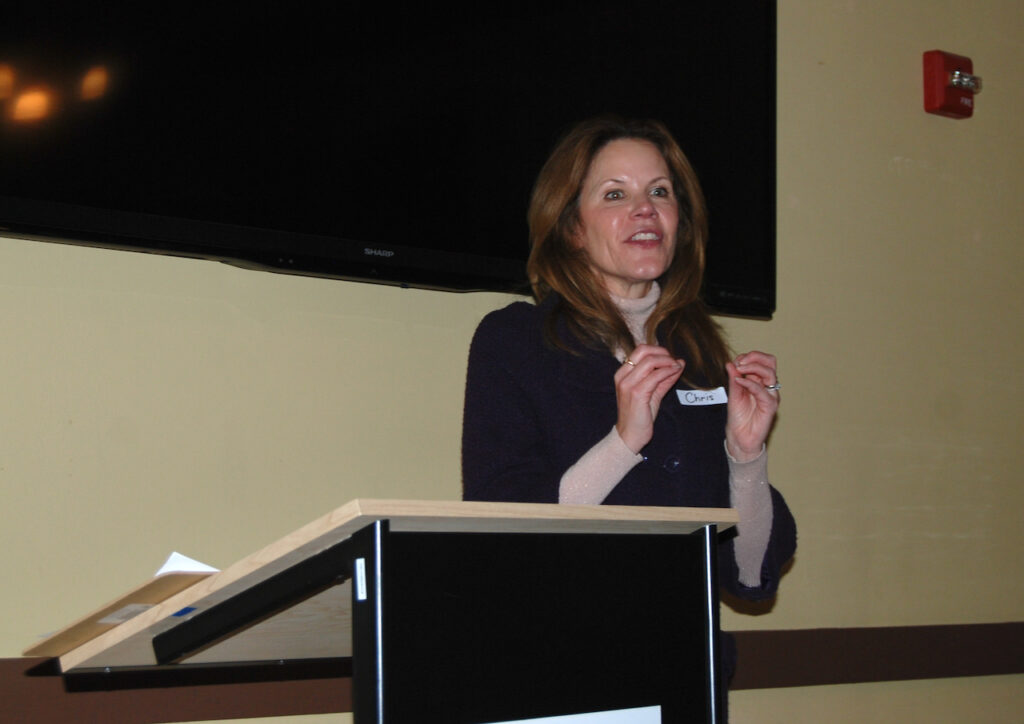
Dane County Circuit Court Judge Chris Taylor, who is running for a seat on the Wisconsin Court of Appeals District 4, addresses attendees gathered during a reception hosted Sunday by the Jefferson County Democratic Party.
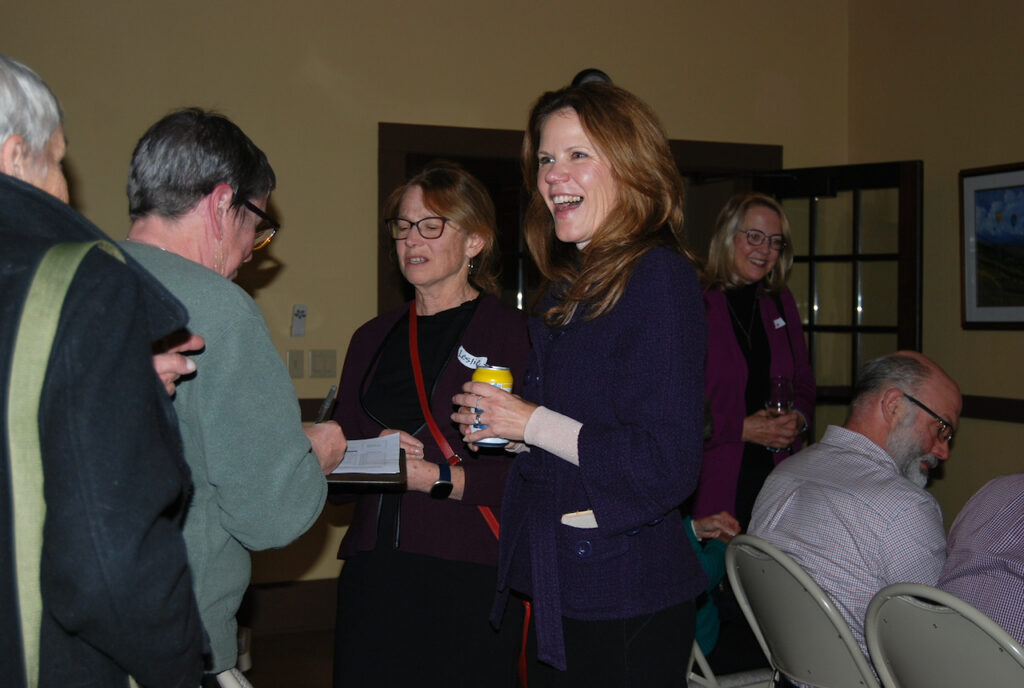
Dane County Circuit Court Judge Chris Taylor, who is running for a seat on the Wisconsin Court of Appeals District 4, gathers Nomination Paper for Nonpartisan Office signatures, a step which candidates must complete for inclusion on an upcoming ballot. Taylor told those in attendance Sunday during a Jefferson County Democratic Party reception that she needed at least 1,000 signature to secure a place on the April, 2023, ballot.
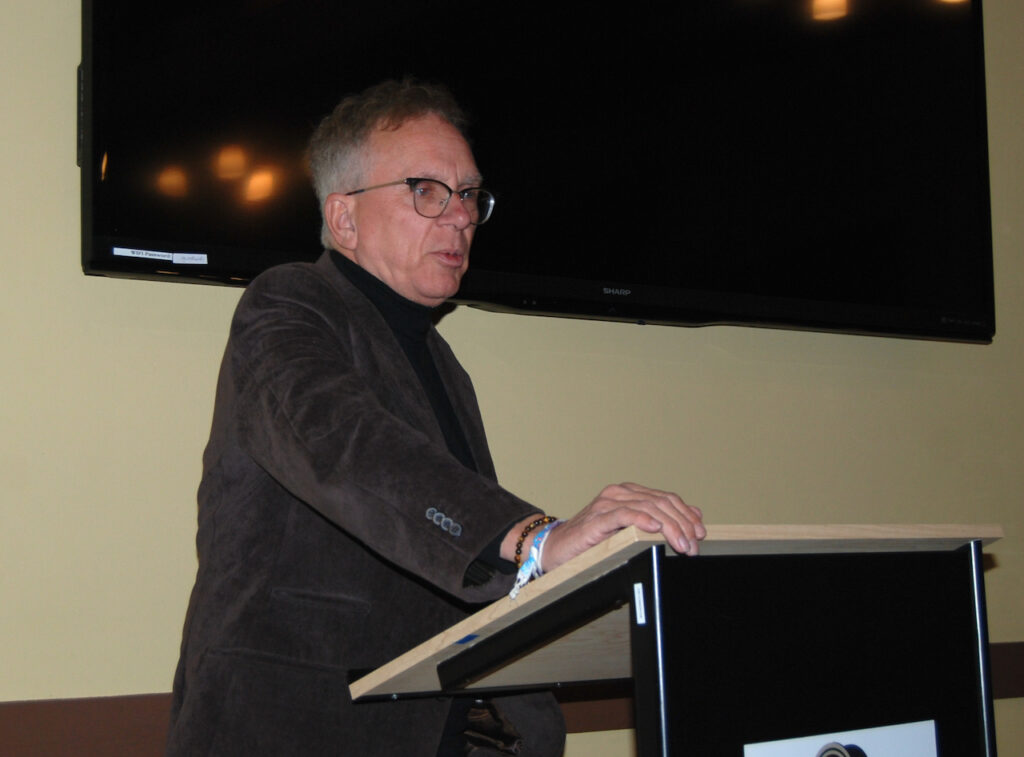
Progressive journalist and author John Nichols addresses event-goers Sunday. He served as the event’s keynote speaker. His comments are included in a story found here: https://fortatkinsononline.com/john-nichols-addresses-jefferson-county-democrats-at-fort-community-club/.
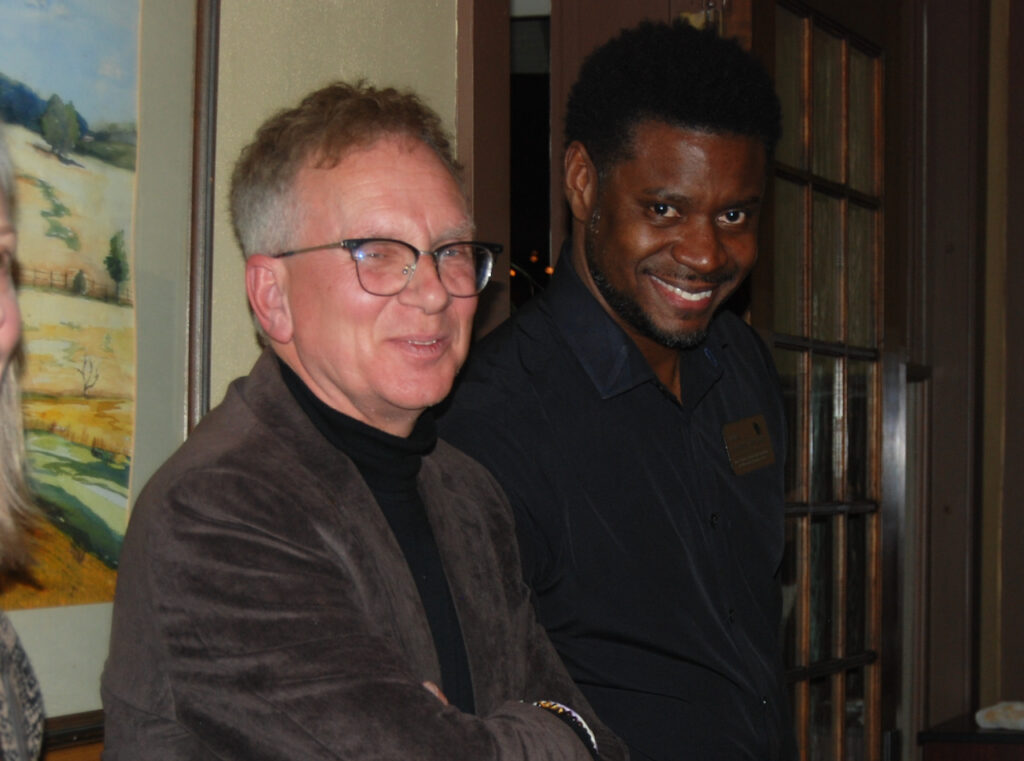
Keynote speaker John Nichols, at left, and Wisconsin Supreme Court candidate Everette Mitchell converse during the reception.
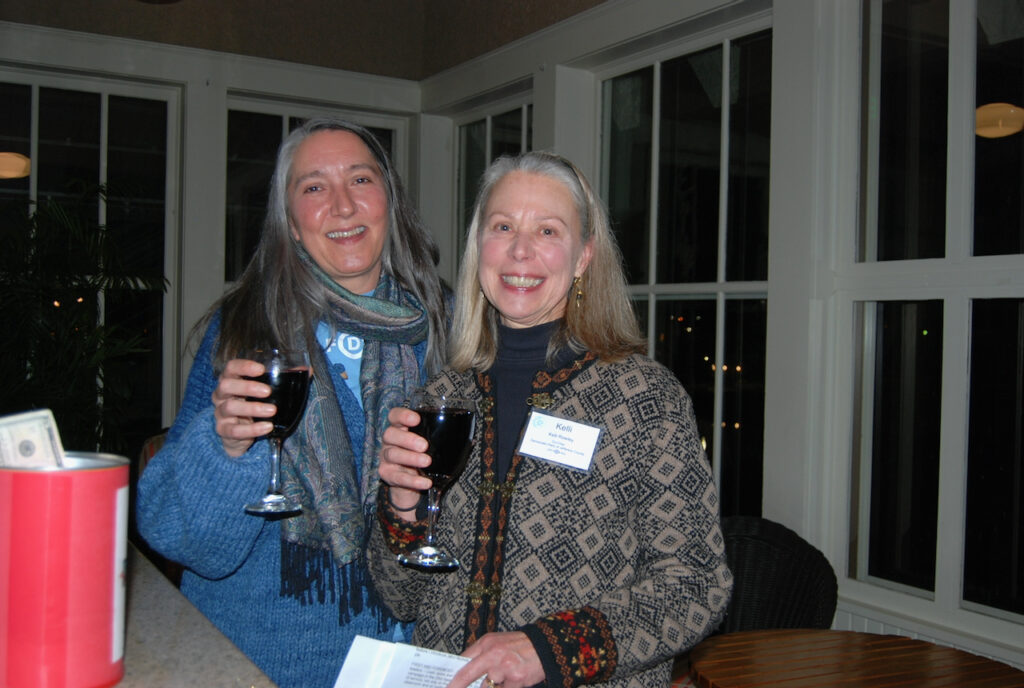
Jefferson County Democratic Party Co-Chairs Shauna Meyer, at left, and Kelli Crowley visit during the reception.
Kim McDarison photos.
This post has already been read 1212 times!
